
This is the badassery that is Pamela Clare Wylie Samuelson.
No Title
No Description
Pamela: I used to teach at a school, here in L.A., just for a couple of years, that is a super radical alternative school, where, apparently— I also was partnered for almost five years with a man who had been a student there as a child, and then, grew up and became a teacher there. And he described from his own childhood, that part of the curriculum of this school, which is a play-based school that goes up now through age 11, part of what they facilitated for the kids, is what he called “Cozy Plans” or “Naked Plans,” where kids, generally littler kids, like six or seven, would say, “We’re gonna have a plan; the three of us are gonna go over there and build a fort and then we’re gonna get naked and we’re gonna be inside.” And a teacher at this school could say, “Okay great, let’s sit down for a second, and let’s talk about, does anybody have any limits?” And they could say, “I don’t want anyone to touch my butt,” “I don’t want anyone to,” you know, “look at this part of me,” “I don’t want—“ what— you know, whatever they, they knew that they weren’t comfortable with, and the teacher would make sure that everyone felt like they’d been heard, and, would say, “Okay great, well, I’m gonna come and check on you in ten minutes. Um, and go— you know, go have a good time.” And then would go and just kind of call into the fort, “Is everyone doing okay?” And they would all say yes or no and if there were problems, the teacher could help them to work it out between them. And it has always blown my mind that that could be a thing that could happen in public, could happen socially, and could be mediated by a responsible adult, who wasn’t afraid of, the rampant sexuality, and explorations of children, because I think, my experience of kids as a educator, you know, since I graduated from college, so we’re going on, w— you know, I’m approaching two decades, I’m now 40, is that kids are really sexy. They just are, and it makes everyone so uncomfortable—
Lila: (overlapping) Uncomfortable.
Pamela: — to admit that and talk about it. But it’s just real. Like, we’re sexy people. And that starts really early, we’re in bodies that experience pleasure.
Lila: Right.
Pamela: And minds, you know, we have minds that produce imaginative fantasies and those things coincide. That’s just part of life… That part of the curriculum at that school was shut down after the McMartin case broke, which was another school in L.A., in Manhattan Beach, where there was a terrible child abuse case.
Lila: Oh no.
Pamela: And that made everyone so terrified and so paranoid that they stopped it. And now it’s not a part of what they offer there at all, it’s not— I can’t imagine what would happen now if a kid was like, “Yeah, I wanna go have a Sexy Plan, in that corner.”
Lila: Gosh, and the—
Pamela: But what an opportunity, right?
Lila: The only thing I’ve ever heard of that had the possibility of teaching children that their body is their own, they can do with it as they like, they can set their boundaries, they can communicate about their boundaries, they can change their minds, I mean we— the rest of us have to make all these mistakes and maybe we get to learn it when we’re—
Pamela: Right.
Lila: (laughing, slightly painfully) — in our 30s or something.
Pamela: Right.
Lila: Oh wow.
Pamela: But this is the whole discussion around consent education and what actually is appropriate to talk with people about at different ages, like how do you scale that, developmentally? How do you talk with a 5 year-old about consent?
Lila: Do you—
Pamela: Because it’s super important!
Lila: Do you have ideas about that?
Pamela: Yeah. It’s something that I’ve been working on, on and off for years. It was a big project that I, that kind of grew out of time teaching sex ed for Planned Parenthood. Going into 9th grade classrooms, and, you know, got to a certain point and then was shelved, and then when I went and trained as a Sexological Bodyworker, which I did while I was pregnant, in 2015. That was a really big piece of what I wanted to do with that education, was to start to really consider, and then offer, to young people, different— a different model than I’ve ever seen. […] Just to really be doing something and offering a kind of education that could work for people at different ages, and that would teach those very basic skills around body ownership and body sovereignty and communication and, desire and that it’s okay, and listening to other people, and…
body sovereignty aka self-ownership (noun) = the right to do with one’s body and life as one pleases. Particularly relevant to #metoo and in the education of children, this directly correlates to the concept that it is not okay for someone to engage with us sexually against our will.
#metoo = a movement intended to expose the insidious pervasiveness of sexual violence, assault, and harassment against women. Originated by an organization (Just Be Inc.) and the accompanying movement created by Tarana Burke in 2007 and revived as a hashtag by Alyssa Milano in 2017 on the social media service Twitter, it crystallized into a globally unprecedented era of speaking out.
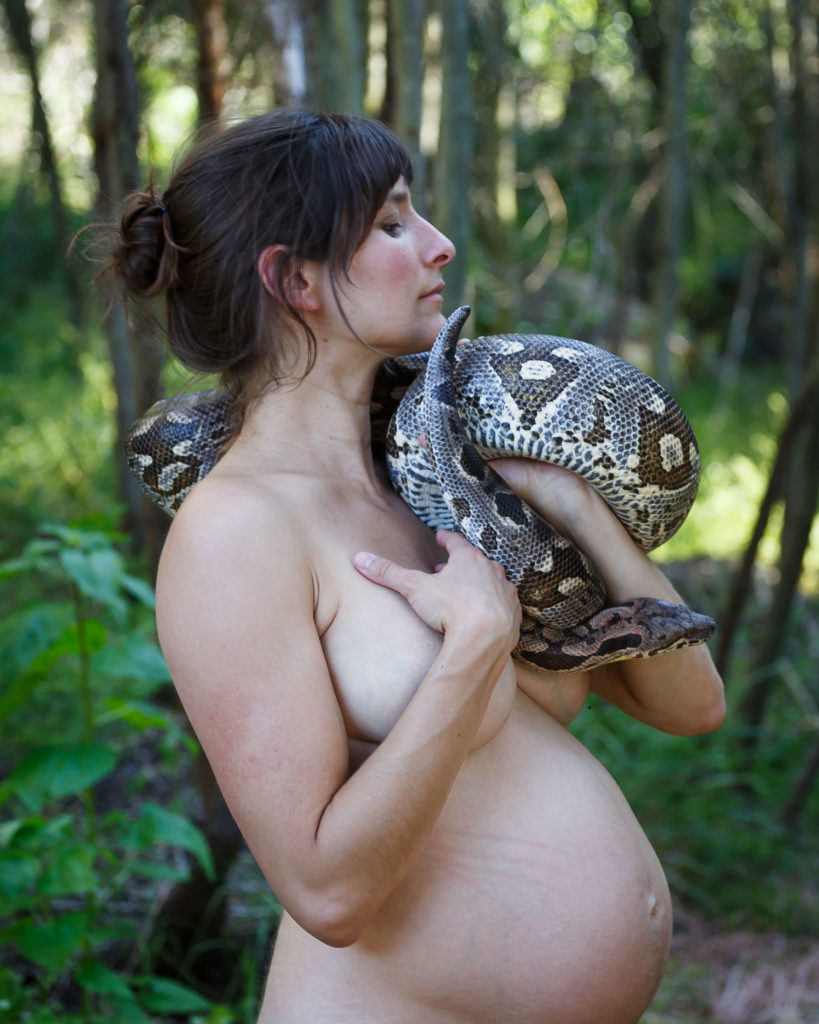
And this is Pamela pregnant, with snake. Commas are important.
Welcome back to horizontal! It’s the podcast recorded while lying down, a robe-clad conversation of intimacies.
This episode was recorded on the L.A. stop of horizontal does america, in a sort of storybook landscaped-jungle wizard’s palace perched on the top of very many steep and wind-y steps.
In the first part of my conversation with Pamela (episode 50. your pussy is not a sheath), we talked about ambiverts, cervical self-exams, femme-drag and bespoke suits, wonder women, moving people’s wombs into a more optimal position, the husband stitch, and Pamela’s viral rant.
Pamela Clare Wylie Samuelson is a bodycare witch, a sex ed teacher, a renegade, an instigator, a libertine. She’s a miracle of a person, a warrior of bodily empowerment. Rosie the Riveter with a speculum. She empowers people with pussies to take command of their sexual health, sexual expression, and life force. I am in deep admiration of her.
The night before I had an abortion, she is the woman I asked for advice.
As a bodywork specialist, she is trained in sexological bodywork, holistic pelvic care, and the Arvigo techniques of Maya Abdominal Therapy. This means that she works on the pelvis and the pussy, both inside and out.
She teaches Sex Ed for Grown-Ass People. She leads workshops like The Ecstatic Body (which explores the profound energetic and structural connection between the jaw and the pelvis), Yoni Healing, and Take Back the Speculum.
I hosted Pamela at Hacienda Studio for a Take Back the Speculum workshop. When I advertised it, I wrote, “Do you have a g-spot? A cervix? How can you be sure? Have you ever seen it?” Pretty much every friend (who has the aforementioned anatomy) that I asked, had never seen it, and when I did a poll on Instagram, most of my listeners (and they are a pretty self-aware group) hadn’t either. I didn’t even think, “A doctor looks inside me… why can’t I?”
This is part of the vast genius that is Pamela Samuelson. She says, “Your doctor works for you. Not the other way around.” You can ask for the size of speculum that you need (I didn’t even know that there were sizes). You can ask to insert it yourself. You can instruct them on the way your body functions. YOU are the EXPERT on your body.
In this second part of our conversation, we discussholding space, Pamela’s come-to-Jesus-meeting with her dad, studying other people’s relationships, age-appropriate sex ed (including the most progressive “naked time” curriculum I’ve ever heard of), mushing (which we clearly all need), body sovereignty, sexological bodywork, and the fertility awareness method of birth control.
***
If you enjoy lying down with us, become of patron of the horizontal arts. Patronage is what makes it possible for me to continue making independent, uncensored, ad free homemade radio. When my crowd-funding grows, I’ll be able to dedicate myself fully to intimacy work, which will mean more live workshops, tours (perhaps with a stop in your city!), bonus episodes, and video…
When we make private conversations public, intimacy becomes contagious, and the more intimate relationships we nourish, the happier our lives. Be part of it through Patreon.
For $10 a month, you’ll get access to the love poem of the month, a private recording of one of my favorites, an invite to a private curated Facebook group, and a post of GPG (Genuine Public Gratitude – or Genuine Private Gratitude, if you so prefer). For $20 a month, you’ll get those things plus two tickets to a live show, or access to secret episodes, and so on. You’ll be directly empowering me to make the world a more intimate place.
For more horizontality:
I send what I call “missives” to my email list once a week. It’s like lobbing a thousands messages in a bottle out to sea. I share my writing (the most recent was about my abortion and the right to choose), I share resources from the episodes, saucy photos, and other miscellaneous bits of interest and ephemera, like that time I was in Playboy … talking about dating outside of your political party in the era of Trump. To receive all this goodness directly in your inbox, sign up on horizontalwithlila.com and add lila@horizontalwithlila.com to your address book, for good measure. We don’t want it getting lost in some “updates” tab or something, do we? No we do not.
Now come lie down with us!
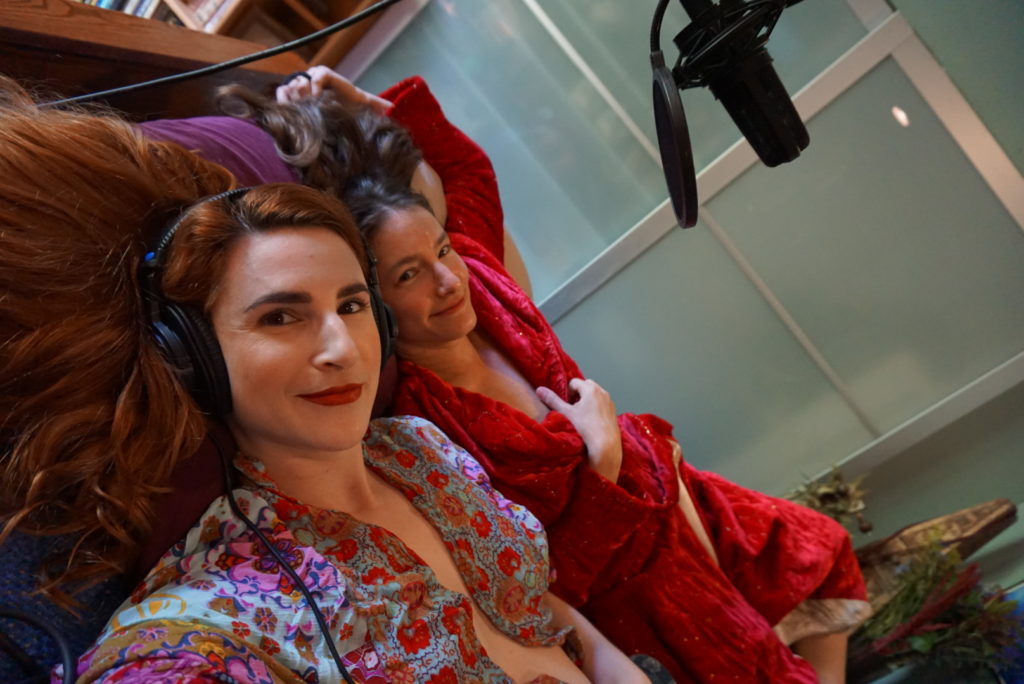
horizontal with Pamela in Silver Lake, California. November 2017
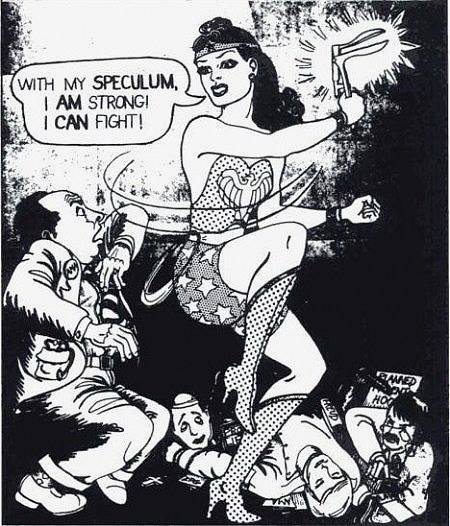
Take Back the Speculum!
Links to Things:
Patron of the horizontal arts!
Pamela on the interwebz. Facebook + Instagram
Take Back the Speculum, Pamela’s campaign to put control over our sexual health examinations back in our own hands (literally)
Hacienda Maison, the sex-positive retreat space in New Orleans (housed in a sumptuous, renovated mansion), a sister location to Hacienda Villa, Lila’s sex-positive intentional community home
Joseph Kramer, the creator of the (legal) profession of Sexological Bodywork
The Body Electric School, the center for erotic massage that Kramer created in 1984
The Arvigo Techniques of Maya Abdominal Therapy, a modality of external low abdominal massage, which Pamela practices
Holistic Pelvic Care, a modality that Pamela learned from Tami Kent, the involves internal pelvic massage and energetic work
The Anger Room in Dallas, a place to “come in, break shit, and leave happy.” The Wrecking Room is the Anger Room’s NYC equivalent.
* Girls and Sex, by Peggy Orenstein. A book Pamela highly recommends, written by the mother of a young woman, and based on interviews with 70 young women, that takes the pulse of young female sexuality, and addresses a cultural phenomenon that “young women now feel completely at liberty to have all the sex they want, but not to have all the sexual pleasure they want.”
Cycles & Sex, the event (all about pussies, not bicycles) where Pamela and Lila first met!
The Business of Being Born, a documentary by Ricki Lake and Abby Epstein, which scrutinizes the U.S. system of birthing, involving doctors, hospitals, and drugs, in opposition to the midwife system in place in many other cultures.
Sweetening the Pill, or, How We Got Hooked on Hormonal Birth Control, by Holly Grigg-Spall, the book on which Ricki Lake & Abby Epstein’s forthcoming documentary is based.
A New View of a Woman’s Body, Pamela’s beloved anatomy book for illustrations of the vulva, written by a group of women in the 70s united by…
Carol Downer, a longstanding feminist activist, lawyer, and a founder of the Federation Of Feminist Women’s Health Centers.
* buying through my affiliate links is a form of patronage, as I’ll receive a small percentage!
Show Notes (feel free to share quotes/resources on social media, and please link to this website or my Patreon!):
website link: https://horizontalwithlila.com/
Patreon link: https://www.patreon.com/horizontalwithlila
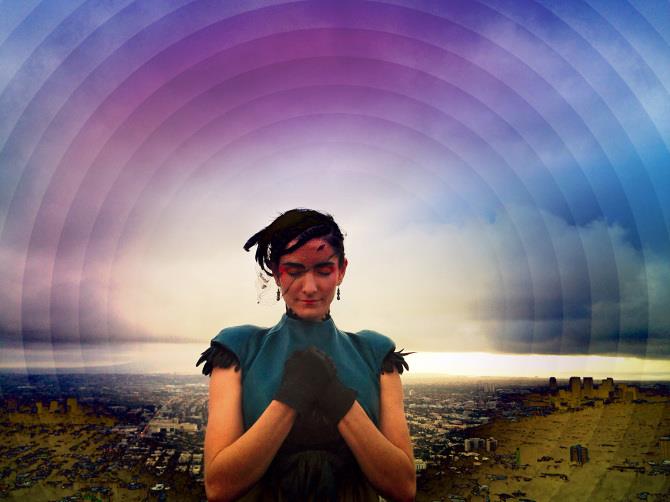
This is Pamela as seen by Lee Free & Kelly Horrigan handmade.
[7:20] Pamela on her viral post about body ownership and the incredible response from people all over the world — in Pakistan, Australia, Kenya, and so on.
[8:53] Lila and Pamela on holding space.
Lila: So my sense was that holding space was showing up for what was there, without attempting to change it — but knowing that, showing up and accepting what is there, may very well change it.
Pamela: Mph. That’s great. (pause) I think for me holding space is about bringing permission and approval to whatever’s actually happening.
holding space (verb) = showing up for what is present with another person, without attempting to change it — knowing that the act of showing up and accepting what is there, may very well change it.
[10:22] The possible origin of Lila’s defensiveness.
Lila: Something that I have noticed as I’ve been on the road and had loooong stretches to myself, where I don’t listen to music, and, if I listen to something I listen to a book, or a podcast, but I also, whenever I feel like it, turn it off and have total silence—
Pamela: Oh my God that sounds so dreamy.
Lila: Yeah and just— just drive with m’self. And, something that I’ve noticed come up is, an internal mechanism of formulating how I’m going to defend my choices.
Pamela: Huh!
Lila: To the people who are going to question them.
Pamela: On a particular topic?
Lila: On any choice that will be visible to others.
Pamela: Huh!
Lila: And I didn’t recognize that I was doing this until this road trip, and … then I talked to my mom on the phone.
Pamela: Ah.
Lila: And I went, “Oh MY.”
Pamela: Were you preparing for your mom?
Lila: It’s like I’m always preparing for my mom.
Pamela: (under her breath) Fuuuck!
Lila: Even though I have learned not to tell her everything. Because we had a, probably an inappropriately open exchange and sharing of what was happening, in our lives. And (laughing) it’s, it’s only in recent years that I thought, Oh, you know, you just don’t, you don’t have to tell her everything, if you’re gonna have to defend something, you don’t have to, you don’t have to tell her! I wasn’t telling her everything everything, but near enough, I was sharing a lot.
Pamela: (quietly) Right.
Lila: And I haven’t even told her about this podcast, because I don’t, I don’t want to deal with the fear that’s going to arise in her knowing that I’m sharing such tender details with— anyone who will listen.
Pamela: Sure.
Lila: And, everything, she questions it, and usually she— maybe I’m trying to think of the thing before she says it, so that I have something to res— you know, respond, when she says, “Well why don’t you do this?” or, “Why aren’t you doing that?” (exasperated sigh) An—
Pamela: Well, we internalize our detractors.
Lila: Sure. And my ex-boyfriend too.
Pamela: Ah.
Lila: And I was probably like that with him as well. If I’m really honest.
Pamela: Which you are. (both giggle, Lila slightly maniacally)
Lila: (sighs) But, I have been telling myself, you know, in the car, by myself: It can be whatever temperature I want, I can open this window and not that window, I can stop, now, and I can hold it, now, you know, it’s my— and that’s why I’m traveling alone!
Pamela: Yeah.
Lila: That’s why I’m not traveling with someone, specifically. So that I can be at my own beck and call.
Pamela: Totally.
Lila: So that I’m not catering to other people’s, needs desires whims—
Pamela: Mmhm.
Lila: And that I don’t need to defend my choices to anyone!
Pamela: Mmhm.
Lila: And so I’m really trying to cultivate that voice in myself that, that talks back and says, “It’s okay, baby. You can do whatever you want. You can do whatever you want!”
Pamela: I think that’s a really important experience, especially when you’re living in community.
Lila: Mmm!
Pamela: And especially when you’re living in a community that places such a high premium on communication, and openness, to just have really private, private space.
[14:22] Lila on how housemates protect their private space at the Villa.
[15:48]
Lila: Yeah, the de- defensiveness is something that I’d like to soften, and I, I would like to do it before my mom dies. And I’m going to go see her, in a few weeks, when I make it across to Florida, and I am, not looking forward to it. I wish I— you know those people who post on Facebook, “I have the best mom in the world”? I wish I had that kind of enthusiasm and love to offer my mother, ‘cause she wants it from me so badly. (sigh) She’s. She’s a good human being. She’s well-intentioned; she loves me. It’s really, hard though. I never, give her what she wants. I don’t know it’s— that it’s even possible. To do so.
[17:00] Pamela’s origin story.
Pamela: My parents split when I was two, and I lived, primarily with my mom, and visited my dad, and, I have, always been, close with my mom, even though there have been long stretches of our relationship being insanely difficult, very contentious, and we’ve taken a lot of space during those times. I left for college in New York, and then stayed gone for 7 or 8 years, before I moved back, and—
Lila: Back to where?
Pamela: I came back here. I grew up here. Born and raised in L.A. […] But I’ve lived years in New York, and lived in India for about a year and a half total, and moved to Puerto Rico for the better part of a year, and, um, have been away enough, and travel also enough that I feel myself part of community in lots of different places. Yeah, and I’ve just had, a kind of, you know, dance of proximity with my mom, which has been really helpful in, in remaining close, with her, through really difficult times, like shitty communication and, a lot of expectation, um, and with my dad, I would say that we … didn’t become close, like we didn’t become friends until I was in my 20s, when I had a sort of come-to-Jesus with him, um … we had a, I don’t want to say a fake relationship, but we had a very, um, appearances-based relationship— I guess that is a fake relationship. He I think was just not available to me. But I distanced myself also from him. In that experience. And, then, had the opportunity when I was I think maybe 23. I was sitting with him, for his birthday dinner; he happened to be in New York on business and was staying with me, in this crazy, tiny apartment, that I was in, on the Lower East Side. Or in the East Village, in Alphabet City, and I don’t know where I got the guts to do it— I was pretty sure he would walk out of the restaurant and I would never see him again. But I … said to him, “You have no idea who I am!” (chuckling) “You have no idea, and you’re missing out… You know, this could be real. And it’s just not.” And he’s, a really kind man, actually. And that got his attention. And we started to communicate like people, who actually wanted to know each other. And it’s taken me a really long time to accept that, as something that was truly happening— I was really used to not having that, and not really having his attention, and it’s taken me many years to feel actually stable in that level of communication with him, but … it genuinely changed.
[20:23] Did Pamela’s mother have other partners after Pamela’s father?
[20:48] Pamela on studying other people’s relationships.
Pamela: I think I’ve had to forge my own template, for … what love is, in that way, with a partner. I think I’ve had to sort of figure it out for myself, because I didn’t want any of what I saw. And, remember a lot of, you know, being in high school and being in college and observing the families of close friends, whose parents had relationships that I loved, and, in the same way that friends of mine who have Asberger’s describe studying what other people do when they have certain feelings, because it doesn’t come naturally to them—
Lila: Yeah…
Pamela: I sort of studied what other people’s parents were doing in relationships. And what couples were doing that had, a love I really admired. And, and longed for. But it’s— it took me certainly a very long time to get to be the person that I actually wanted to be in relationship. And to have relationships that last. The two partnerships that I am in— one of them is with a man with whom I have a two year-old daughter, and we’ve been together for over six years, and I have a long-distance relationship with a woman in Oakland, who is, absolutely my soulmate, as well, and, who I have a deeply deeply romantic love for, and we’ve been together for over three years. And that for me is long. Both of those are quite long. And they feel very stable. And the communication is awesome. And I feel like I can be completely, truthfully myself, and fully accept both of those people, exactly as they are, and those are — those are huge steps for me.
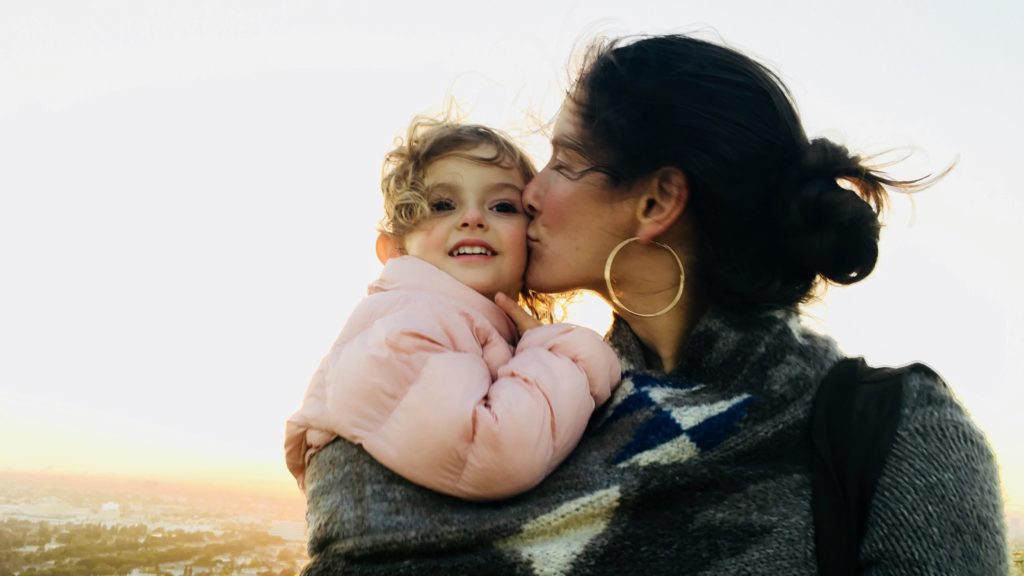
This is Pamela. And her daughter.
[22:44]
Lila: Mm. Do you identify as polyamorous?
Pamela: I identify as polyamorous not in the sense of the word that I see… most commonly expressed, like I’m not— well, no. I changed my mind. (laughs heartily) With that statement.
Lila: Yeah! You can do that.
Pamela: I consider myself polyamorous and I think I always have been. But not in the sense of, being interested in casual encounters, because I’m not, and I haven’t been in a really long time.
Lila: I call myself poly-adjacent, (Pamela titters) because I’m around so many poly people. My experience of them is that most of them are interested in serious longstanding, ongoing, love relationships.
[24:39] Pamela on the development of her sluthood and fear of expressing it as a young woman.
Pamela: So, super-sexual as a kid, and then, just very curious, and very much a polyamorous slut at heart, and very afraid, and so very— very afraid I think, to actually be that. What I wanted to be. To be the thing that I actually was. And I think just through a long process of being in different relationships with men and with women, (big in-breath) met some teachers and read some books— I studied with a man who is a— kind of Taoist teacher of sexuality for a couple of years, and that was— an enormous pivot, for me, in being able to feel myself. And just make proper, direct contact with my own sexual energy, and my own sexual body. And just through kind of study, I just sort of danced around my desire to be a sex worker, essentially, for years, out of fear and shame, and as I’ve gotten older, and am less afraid, and less ashamed, it has seemed more and more like the obvious thing to do. And I’ve been a bodyworker now for 18 years. I started doing it straight out of college. And so, to transition that into being the kind of bodyworker that I am, which is very focused on somatic content, and very present with the, the, the presence and quality of memories in the body. You know, of emotional content in the body. Um, being present to that in the pelvis. Because of course, as a bodyworker, you’re trained to completely avoid the pelvis, for reasons of legality, you’re not allowed to go anywhere near the genitals, you’re not allowed to, you know, there’s this very careful draping that happens, and you’re not to look or touch or any of that, you know you’re taught to carefully ignore if a male client gets an erection, and, all of this, so getting to kind of move all of that aside and actually be present with the pelvis, which is structurally, functionally, the major hinge of the body, and is a place where— people have enormous dysfunction. Of all sorts!
Lila: Oh yeah.
Pamela: You know, sexual and otherwise. There’s just so much that goes on there, that’s not addressed and not touched and not seen and not discussed because we live in a, you know the kind of—
Lila: Sex-negative society.
Pamela: We live in a post-Puritan culture! Where nobody thinks that it’s okay to talk about, so, having the liberty and giving myself the liberty, and giving others the liberty to fucking talk about it, has been a real marvel. It’s been great. I love it. Sexological bodywork, as a, as a phenomenon, is just a work of genius; it was started by Joseph Kramer, kind of out of the ashes of The Body Electric School, and is just a way to be a legal practitioner — there’s a Code of Ethics: you have to wear gloves, all touch is one way, the practitioner stays clothed, and a couple of other things, but just like, to distinguish it from the kind of world of sex work, which takes all forms, to make it something that, like, the state of California can recognize as a therapeutic modality, so that I can do genital work with people is amazing! And you don’t even need that in some other states, in Oregon you can touch genitals as a licensed massage therapist, and it’s considered therapeutic. And they’re just, much less concerned about it.
[29:10] Lila’s sexological bodywork / thai bodywork trade / date in Berlin.
Lila: I received a— it was a date, so it wasn’t in a professional capacity, but— from someone who was studying sexological bodywork. I traded— because I do Thai. So we, we traded— I worked on him and then he worked on me, and it was, possibly the single most arousing thing I have ever experienced.
Pamela: Cool.
Lila: And then we did— we did have intercourse and it was … lovely. And intense.
Pamela: That’s great.
Lila: But energetically, it was like (makes Star Wars lightsaber noises) … universes opening up and—
Pamela: Yeah. It gives you a sense, I think, of what’s possible in intercourse— that’s so cool that you got to then, have intercourse with someone that you were lovers with—
Lila: Yeah.
Pamela: After receiving that.
Lila: Yeah.
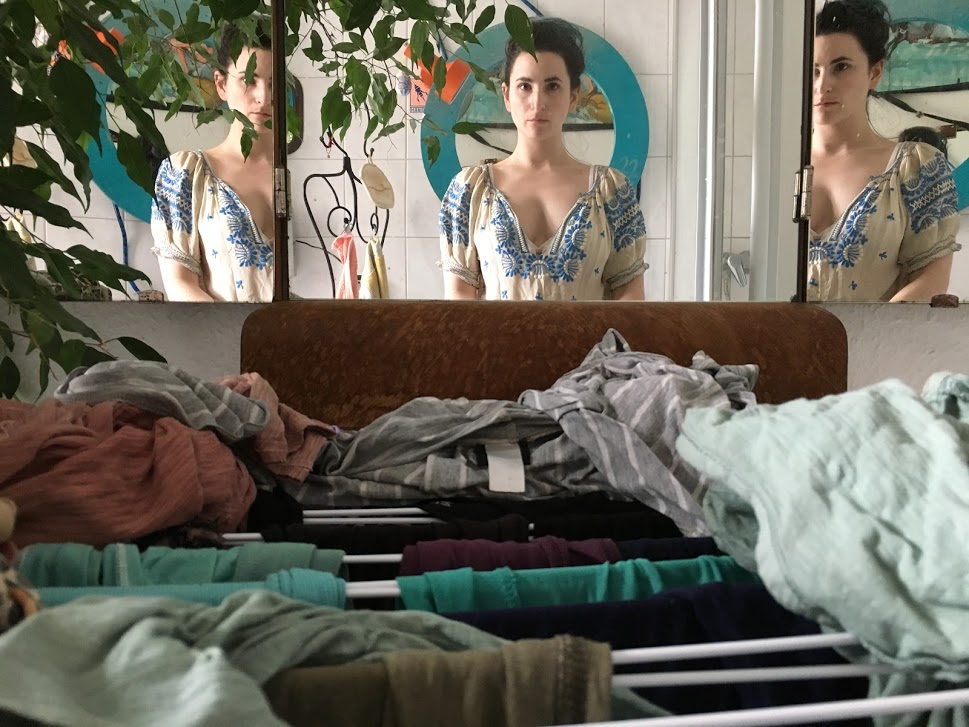
The Bathroom Portraits: Private Residence. Berlin, Germany. June 2016 [Note: not taken on the same day as the sexological bodywork session. I was MUCH happier on that day.]
Pamela: ‘Cause that really does give you the sense of like, “Oh, this is what’s possible if I am really aroused.
Lila: (overlapping) Really aroused.
Pamela: If I’ve been paid all the attention, in every way that I need it, before penetration. And then what’s possible.
Lila: Actually, I did feel like, “This is what it’s like to be really aroused, but yet still, I don’t think I was ready.
Pamela: Ah.
Lila: For penetration.
Pamela: I would love to know, in the future, when it happens, (Lila mmhm’s) because I feel certain that it will happen, what happens when you do feel ready? Like,when you are at that point of just, absolutely, requiring penetration, and getting it. How that is for you. And what happens.
Lila: I’ll report back.
[30:55] Pamela’s and her mother’s house.
Pamela: So I learned about sex from my mom. My mom was, the mom in high school, who said, “If you’re gonna have sex with anyone, this is your house, so please feel free to bring them here; don’t go have sex in a car, where you’re gonna get arrested, or at somebody’s house where their parents aren’t gonna be cool about it. Like, this is your place, you can bring anyone home.” Which was amazing.
Lila: That is amazing.
Pamela: And so, I ended up of course having the house where people, like, everyone came, (laughs) there were constantly people staying at my house.
Lila: In order to have sex?
Pamela: Not just in order to have sex, but just because it was a comfortable place to be, like, she felt the same way about getting high, if you’re gonna experiment with drugs, like please do them in a place that is private and safe and not in a place where you’re gonna get picked up by cops.
[32:50] What happens when Lila asserts boundaries with her mom?
[33:20]
Pamela: How do you feel when you’re clearly stating your needs to her? Is she able to hear you?
Lila: I feel guilty.
Pamela: Ah.
Lila: I feel annoyed. Frustrated. I feel a glimmer of revulsion.
Pamela: Mmph.
Lila: And hatred. I feel sad. (huffs through her nostrils a little) I feel proud. And I usually feel really exasperated.
Pamela: Does she meet you, in it, or do you have to keep explaining yourself?
Lila: (long pause, small sigh) I don’t know.
Pamela: (overlapping) Does she want to know?
Lila: Does she want to know…?
Pamela: What you need.
Lila: No I think she’s really focused on what she’s not getting.
Pamela: Ahh.
Lila: And I am sure that I have done that, and I’m sure that I have done that several times with my most recent ex. (Pamela mm’s) That I was really concerned with what I wasn’t getting, and … was not attentive to — or concerned about — what was going on with him. And I, I really have to (sigh) … it’s a challenging line for me to walk as a codependent person. (Pamela mmhm’s) When do I need to take care of myself, even if it upsets somebody else or makes them angry or, they feel hurt. And when do I need to, to respond to my caretaking impulses.
[36:04] How did Pamela become a vagina whisperer?
Pamela: Well. As a child, I had a voracious sex drive. I started masturbating early, and I masturbated to orgasm all the time, to the extent that I made myself sore and was taken to the doctor.
Lila: (like a muppet) WhOOOAaa!
Pamela: Who said, “You’ve gotta cut this out,” and I recall looking him square in the eye and saying, “I don’t know what you mean.” (both crack up) Thinking to myself, It’s none of your fucking business.
Lila: Oh that’s wonderful.
Pamela: Probably not fucking, but it’s, yeah it’s—
Lila: How old are you, five, six?
Pamela: I was probably, at the time of the doctor visit, I was probably like seven. Maybe seven or eight.
Lila: None of your business.
Pamela: Yeah, just looked at him and lied. (both crack up)
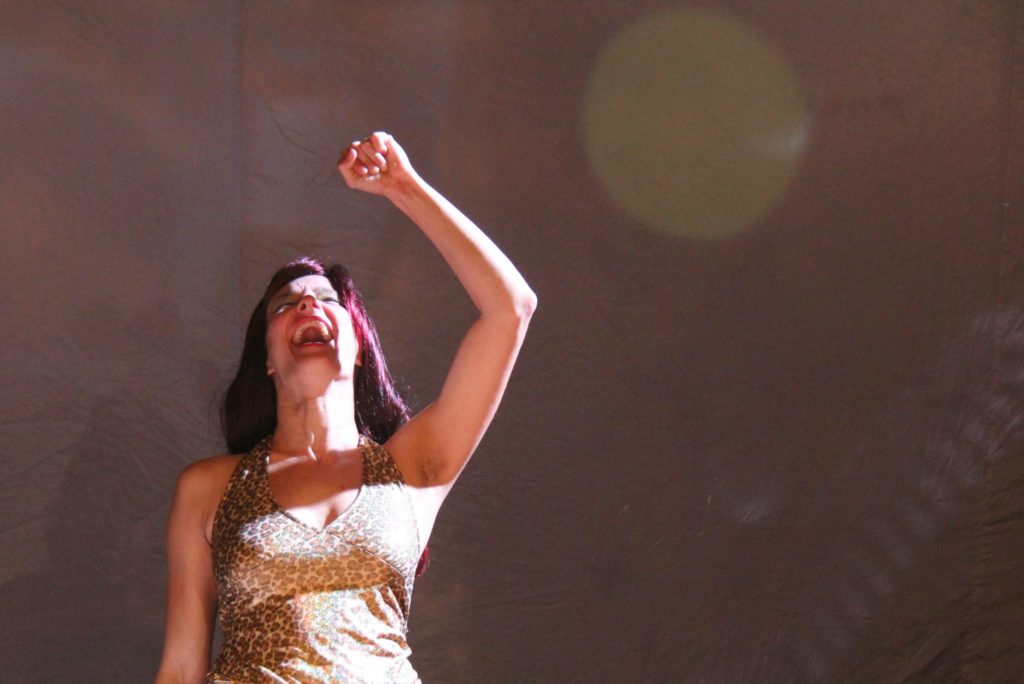
[37:13]
Pamela: Yeah, and recall fully fantasizing in like, mid-grade school. (beat) Um.
Lila: When you say “fully fantasizing.”
Pamela: Like having full sexual fantasies that I was … whispering to myself. You know, I was like having, um, full solo sexytime, quite sophisticated sexytime at a really young age.
Lila: Do you remember what the fantasies were?
Pamela: Boys in my class— I didn’t realize that I was attracted to girls until I was in high school. There was one girl who was my best friend, who at one point I had a serious, shattering, ohshit moment with, of realizing that I was ferociously attracted to her. And, it effectively ended our friendship, because I found myself unable to tell her, I thought that I would just scare the shit out of her. And then of course found out some years later that she had felt exactly the same way about me. (Lila gasps) Was also, in the terror, so.
Lila: Oh no!
Pamela: That is one of the great tragedies of my early life.
[38:29]
Pamela: The early sexual stuff was all boys in my class and, I don’t know, there’s, there’s a question for me as to whether I was actually inappropriately introduced to sex by an adult or by someone who, did it abusively, early in my life because there’s a level to the sophistication and then also a, a kind of pattern in myself in relationship that has made me wonder if there’s something that I can’t remember.
Lila: That is so interesting, and I wonder the same about myself, because I was actually told later — I had this babysitter, and she was my favorite person in the entire planet and I wanted so much to be like her, and I wanted to, to, be babysat as much as possible, and she was, she was a singer and an actress, she, I went to see her do Carousel at her high school, and I think that’s why I wanted to become an actress, at, at such a young age, and, I remember that, she used to— I would braid her hair, and she would braid my hair, and I remember, you know, her picking me up and kind of like, bouncing me on her hip and looking in the mirror and singing a little song: Who’s that girl in the mirror? Lila, Lila! Who’s that other girl in the mirror? Lisa, Lisa! And I just absolutely adored, this… human. And then many many years later, she became, wildly religious. And she called me to confess that she had touched me inappropriately as a child.
Pamela: Oh!
Lila: And said, that she knew it was no excuse for it, but, you know, her father at that time had a lot of porn around the house. And I don’t remember anything else that she said to me in that conversation. And I to this day do not remember her ever touching me. I don’t recall.
[41:32] The radical alternative school where they once had the most progressive practical sex ed I have ever heard of in my life.
[46:07] What is age-appropriate sex ed?
Pamela: Well, it’s difficult because I feel like I could go into a group of 5, 6, 7 year-olds, and talk about consent and pleasure, but whether or not that would be acceptable to their parents, or to their other, um, caregivers, if it was in a school, I i— I can’t imagine what school would be okay with that.
Lila: Mm, of course, but I mean t—.
Pamela: At that age.
Lila: Taking out the— the societal judgement piece, and just speaking to the developmental piece, what is appropriate for certain ages?
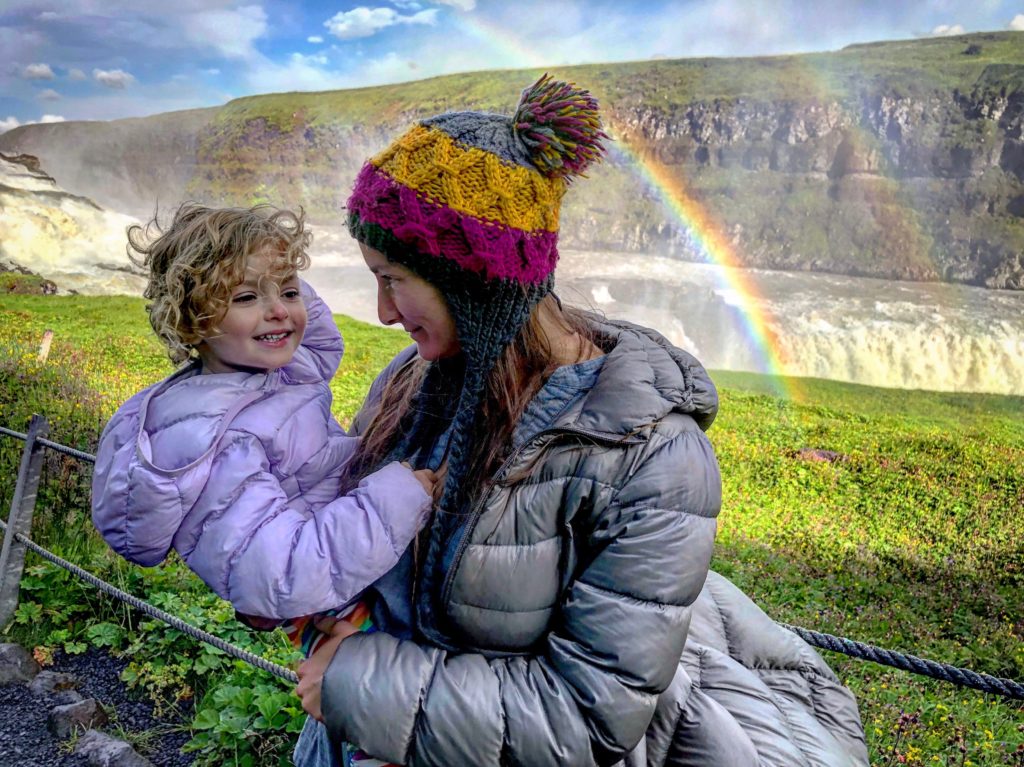
Pamela: I think talking about how your body is yours, and negotiating how you like to be touched, and it doesn’t actually ever have to turn into a conversation about sexual touch. But just that, um, nobody gets to touch you! That you don’t want to touch you. And to talk about, in an age-appropriate way, you know, talking about, having your feelings and what you can do with your feelings— there’s a whole, there’s a piece that is still taught in that school that’s been very formative for me, um. As an educator and just as a human being, around like, what do you do when you’re having a lot of really destructive feelings and, don’t wanna fucking work out your problem with the person you’re having a problem with? There’s something that they do that’s called mushing, where there’s an area set aside at that school where you can go in and like, beat up objects. (Lila mm’s approvingly) And rip up newspaper and make a lot of noise and there’s no stigma at all—
Lila: Excellent.
Pamela: — about going in there, so you can— you know, if two kids are having a problem, they each, in an ideal moment, get an adult person to support them, if there’s that kind of, you know, if there’s that kind of help available, and they are, they are mediated, essentially, in talking about their own experience — this is what happened for me, this is what I had a problem with, this is what made me angry, and getting to really recognize that they’re being heard by the other kid. And before that point, of being able to communicate, if one of them needs to go mush, they can go mush. And like, get out whatever they need to get out, to come to a place where they can actually feel themselves and hear another person.
Lila: That’s great; we all need that. I want mush—
Pamela: Oh yah.
Lila: Mush rooms for everyone!
Pamela: Seriously, I want mush rooms on every fucking block (laughs) They should be, they should be really widespread. I know people who go to the Goodwill occasionally and buy all the dishes and go into a back alley and break them (Lila laughs) ‘cause that’s like the best we can do.
Lila: Yeah. There is a place, I think it’s called The Anger Room, that is doing what I had written about in a screenplay a few years back, and that it would be a place where, you know, it costs a certain amount to go into the kitchen and break things, it costs a certain amount to—
Pamela: OhhHHHHhhh.
Lila: — take a bat to a car. It costs a c— you know?
Pamela: (whispering) Oh, I wanna take a bat to a car! (Lila laughs) That feels good. I’ve really wanted to dri— this would be very expensive, but I would really wanna actually just drive a car into a building. […] No injury— I just want the feeling of that impact; I feel like that would do a lot for me.
Lila: (laughs) Wooow.
Pamela: That would excise the deep rage. For sure.
Lila: (sigh of appreciation) I, I love that idea of the mush room—
Pamela: Yeah.
Lila: — before, before you come together to try and hear each other, because, if all you can hear is the blood pounding in your ears, ‘cause, your eyes are about to pop out of their sockets, then how can you listen?
Pamela: Right. If all you wanna do is yell at the other person, how can you take in any part of their experience?
Lila: Right.
Pamela: So, that for me is a big piece, in the consent conversation, because it’s really about listening, it’s about listening to yourself. Trusting yourself. Feeling your own boundaries and feeling very free to state them, in whatever way they need to be stated in that moment. And also being available to hear the boundaries of the other person. Without feeling grievously rejected, or you know, undone, by needing something from another person— so much that you can’t register that they’re having their own experience.
[50:15] Lila on probably liking the attention from her babysitter. Pamela on the power differential between adults and children.
[53:38] On teaching discernment.
Lila: When do you teach them that, just because they want something, doesn’t mean it’s a good idea? (giggles, then both laugh heartily)
Pamela: Huh. Well, when it’s not a good idea that I can think of is when the person or people that you want to do it with, aren’t into it, or when it’s dangerous.
Lila: Those are some, some of the ways that it might not be a good idea!
Pamela: When else is it not a good idea?
Lila: It might not be a good idea if … it would hurt somebody else’s feelings…
Pamela: Oh yeah, of course.
Lila: Mmm, it might not be a good idea if your brain wants to but your body says no, or vice versa…
Pamela: Uhhuh.
Lila: Mmm, might not be a good idea (playful voice) if it’s your teach-er.
Pamela: (giggle) Or it might!
Lila: It might not be a good idea if it’s… if it’s a family member. […] When do we tell kids that they might be preyed upon, and that, that it’s never okay and that they can say no and— (big exhale)
Pamela: I think, always that you can say no, and that the reason to say no is that you don’t want to, and that what not wanting to feels like, is this… You know? ‘Cause of course, consent has the two sides of: These are all the things that feel like “No,” and it’s really okay, always, to say no if you’re feeling those things. And these are all the things that feel like “Yes.”
Lila: Mmm. And what are the things that we point to? So, not wanting to feels like, your stomach hurts; not wanting to feels like…
Pamela: You’re uncomfortable. You have questions. Y— it doesn’t— you wanna wait. You know? I think even just the, the insertion of a pause into a situation, long enough to feel whatever the feelings are. You know? As you said, you can always change your mind, right? (Lila mmhm’s) That even if it feels okay in the beginning, if suddenly you’re like, Yeah, I don’t actually know, how I feel about this, that it’s really okay, to take a moment.
Lila: It would be so, miraculous, I think, really, to instill that in children, because I have a problem with that now.
Pamela: Sure.
Lila: I have brought so many sexual acts to ejaculation that I didn’t want to.
Pamela: Totally. Me too.
Lila: That I was, I didn’t want to continue, I, was done, I wanted the person to leave, and I was— (chuckles) and, you know, consciously or unconsciously I thought, Well they’re not gonna leave until they come so let— just like— like could— okay, like—
Pamela: Yeah.
Lila: — just make that ha—
Pamela: (overlapping) Right. Hurry it up!
Lila: — let’s make it happen quickly.
Pamela: Yeah, yeh.
Lila: Let’s do all the things— all the tricks you know to make it happen faster.
 Pamela: Yeah. Instead of just saying, “Actually, I don’t wanna do this right now. So we’re gonna stop.”
Pamela: Yeah. Instead of just saying, “Actually, I don’t wanna do this right now. So we’re gonna stop.”
[57:37] The “point of no return.”
Lila: I am trying to think of a time when I have ever stopped in the middle of a sexual act, to say that I didn’t want to do it anymore. (pause) And there’s— there’s this false idea that I have had, which means it’s not just me, that there’s a point of no return. […] That you, you cross this point — a cock is inside you, or, inside your mouth, or, you know, you cross a point, and then, well you’ve already, you’ve already consented so, you know, you—
Pamela: So you’re in for the long haul.
Lila: You’re in, you’re in for the long haul, and that is such a fallacy that I want to unwire in myself. (sigh)
Pamela: These are major cultural shifts, that we’re talking about making. You know? Lying here. There’s su— I mean, there is an enormous culture of … (sigh) There is a lot of reinforcement to the idea that if you start a sexual act, that you have to finish it, or your partner will be in pain. Or that you’re a fucking tease. […] To the extent that, my worth has ever been tied up in my ability to deliver sexual pleasure to another person…
Lila: (sigh) Yeah.
Pamela: You know, my place in the world is guaranteed by being fuckable or being attractive—
Lila: Right, my, my—
Pamela: That all goes out the window the moment I say no.
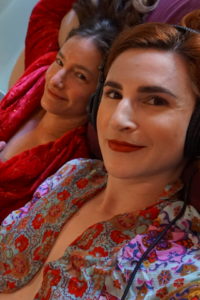
close up and horizontal with Pamela in Silver Lake, CA
Lila: My beauty/charm/charisma / ability to make someone come is my currency.
Pamela: Totally. And what is that currency worth in that system, in that frame, if you say no. This doesn’t work for me.
Lila: Well you can’t, you can’t use those dollars then. Yeah.
Pamela: Which then requires that we’re in a whole other reality. With ourselves, first. And with our partners, second. And with the culture at large, third. You know? That all requires a really hard reboot, I think. There’s a book— there’s an amazing book— do you know Peggy Orenstein? (Lila makes a negatory noise) She’s, a most incredible writer. She’s a really really great investigative, I would call her an investigative journalist, except that she’s, you know, in my experience of her is writing books, rather than articles. She writes a lot about girls and women, and young women and sexuality specifically, and the book of hers that I’ve read now is called Girls and Sex. Which she wrote as the mother of a growing daughter. And she went and interviewed, I wanna say, seventy young women between the ages of 17 and 22, I think, about all kinds of things and had these very very frank interviews with them about, their feelings about their bodies, and how are their sex lives, and what are they comfortable doing, and what’s normal for them and, just to kind of take the, take the pulse of what’s going on right now. And, a lot of it is really alarming, to me. And one of the things that is the most alarming is that across the board, she said that very very few of the women that she interviewed, um, when asked to describe what sex was like for them, described what sex was like for them. (Lila mm’s) They invariably descr— or, not invariably, but almost, to a person, described what the experience of their partner had been like. Which is remarkable, to even think about, like, “Oh how was that sex for you?” “Well, he said this,” or “He experienced that,” or “It was like this for him.” Or even for her, like, for the other. And her, her statement, that has kind of become emblazoned upon my brain at this point, is that young women now feel completely at liberty to have all the sex they want, but not to have all the sexual pleasure they want. And she gives as reason for this— this brings us back to the anatomy, and why this all feels very urgent to me, to be doing things like self-exam. Her reason, that she, she sort of tracks, in the book, for why girls and women are reluctant to be touched, they won’t let their partners go down on them, they, uhh, they don’t want to be looked at, is that they feel like their genitals are at once holy and disgusting. Sacred, and like, super-grotesque and ugly and unlovable.
[1:03:05] “The Barbie.” Pamela on labiaplasty and genital cutting.
[1:04:57]
Pamela: So it is, it feels very important, to me, like, ragingly red alarm urgent to me to be with people, and particularly with people with vulvas in a way that gives all of the permission, and all of the approval, and all of the, the loving witnessing, to, genitals as they are.
[1:05:44] That scene in Good Girls Revolt, set in the 1960’s, where the group leader says, “All right ladies, get out your compacts,” and we know they are going to look at their vulvas for the first time.
[1:07:05]
Lila: That was happening in the 60s. It is now 2017.
Pamela: (lightly) Mmhm. Yup!
Lila: And maybe— I don’t think it’s just the bubble that I’m living in. I think that sex-positive awareness is on the rise. And—
Pamela: Oh yeah.
Lila: And alternative relationship structures are being, being at least more visible if not understood and appreciated, and so I think we are in the, if if society is cyclical. […] So if our society’s sexual mores are cyclical (Pamela mmhm’s) then I think we’re at the height of that free love, or we’re coming towards the height of that resurgence of sexual openness, again, and yet… there are so many people who haven’t even gotten out the mirror and, and looked.
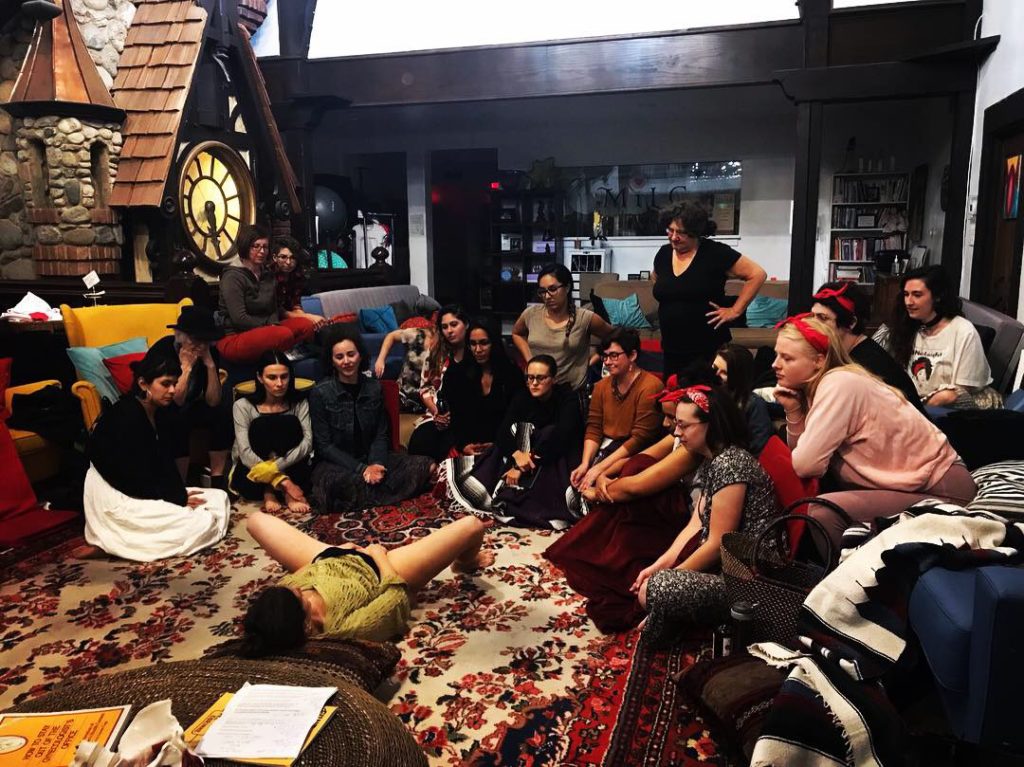
Pamela giving an anatomy lesson on her own body.
Pamela: One of the cool things that happened on Saturday at Cycles & Sex, is that the documentarian team of Ricki Lake and Abby Epstein, who made Business of Being Born, and another one since then, which I haven’t seen—
Lila: It’s the Sweetening the Pill one.
Pamela: They are, they are now working on the Sweetening the Pill documentary, which is the film version, or the, you know, it is inspired by Holly Grigg-Spall’s book, Sweetening the Pill, which is awesome, if you haven’t seen it, it’s great. And that team came into the room for the last cervical exam that I did, and fully filmed me, with my pants dropped, giving an anatomy lesson on my own body, and then giving a cervical exam to myself.
Lila: Whoaaaaaaa, excellent!
Pamela: So, it may be something that not a whole lot of people have seen, but if that movie goes anywhere, a lot of people are gonna see it.
Lila: Oh, I hope so!
[1:09:38]
Pamela: A huge force in my life at the moment and for the last, not very long, less than a year, is the presence of this incredible woman named Carol Downer, who is the founder of the Federation for Feminist Women’s Health Centers, which she did— she started that group before Roe v. Wade, I think it was 1970 or ‘71. They are the group that wrote New View of a Woman’s Body, which was put together by a group of women — not a single M.D. among them — who were basically observing each other at different points in their cycles, and, in different states of arousal, they watched each other masturbate they took, a lot of photographs and then, one woman in the group who was an artist, and went and trained as a medical illustrator so she could do the drawings for that book, Suzann Gage—
Lila: I just got chills.
Pamela: Made beautiful anatomical drawings out of everything and they provided, in that book and in that, in that group, with that work, what are still the most extensive and accurate depictions of female sexual anatomy, that exist. In the world. Like you go and look in medical textbooks and there’s nothing even remotely approaching the detail— because there’s nothing in a medical textbook that I’ve ever seen, that shows women’s tissues in different states of arousal. You can see a flaccid cock and an erect cock—
Lila: Ohhh woww!
Pamela: — but I never see anywhere except in that book a f— a woman who— at rest, the sexual anatomy at rest, the clitoris at rest, and then the clitoris aroused. And in this book there are images of the full scope of the clitoral tissue — all the erectile tissue — with the shaft and the glans, uh, flaccid, and then fully erect, and like, twice the size. It’s really amazing.
[1:11:13] Pamela on her friendship with Carol Downer and Carol’s mission to find or create a name for the female sexual organ (including the vulva and the vagina) as a whole.
[1:13:55] Pamela explains the fertility awareness method of birth control.
fertility awareness method (noun) = a form of birth control (or fertility advantage) in which the person with a vagina can very accurately predict when they are ovulating, by checking the position of their cervix, their vaginal temperature, and vaginal secretions.
[1:14:26]
Pamela: The safe time, when you cannot get pregnant, is anytime between ovulation, and when the period begins. Which is like, two weeks. And when, a body drops an egg, the egg is viable for 24 hours, and that’s it. Which most people don’t know. Sperm, if you’re having hetero sex, lives inside the body for, if you conservatively estimate, up to a week. Most people will say, like three to five days. So that period of a week or so before you ovulate is a danger time. But if you are having a regular stable cycle, which, this is not appropriate for very young people whose, cycle hasn’t established yet, who don’t have a super regular cycle— but if you do have a regular cycle, this is something that you can pretty easily do, is just pay attention— this is not the rhythm method, which relies on the calendar, as though the cycle is, you know, happening according to, your, sort of, ideal timing. You’re like, “Oh, well I bled on the 13th last month, and the month before, I must be about to bleed on the 13th this month.” Which is not necessarily the case if you’re— for lots of different reasons, if you’re traveling or stressed out or any number of things, that can change. But if you’re tracking the actual signs; if you’re taking your temperature, checking your mucus and checking the position of your cervix, you can know, with excellent statistical backing, you can know and refrain from having unprotected sex, if you don’t want to be pregnant, up until your ovulation has definitely passed.
rhythm method aka periodic abstinence (noun) = a relatively ineffective form of birth control that relies on the calendar to predict the time of ovulation, assuming that a menstrual cycle will continue to be perfectly regular, thereby not taking into account extenuating factors such as travel and stress. In the rhythm method, abstinence is used as birth control during the predicted ovulation time.
[1:15:52] Lila asks: How does one start practicing the fertility awareness method?
[1:17:15]
Pamela: When you are closer to ovulation, cervical mucus will be more, kind of thin and sticky, like you can spread it between your fingers, and after ovulation has passed, when you’re getting closer to the time that you’re gonna get your period, it tends to be more clumpy, it will be less clear, it will be more like white-colored. And this all of course is not applicable if you are taking hormonal birth control. And it’s not applicable if you have an infection, ‘cause that will change, that. It will change the consistency and the temperature of you.
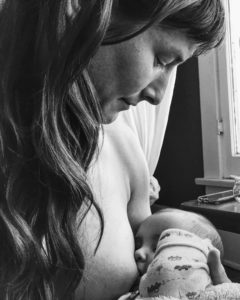
Pamela and the soul that overrode her.
[1:18:11]
Lila: And, during your cycle, your cervix moves in accordance with what?
Pamela: In accordance with— it comes lower when you are closer to your period, and is higher around the time of ovulation.
[1:19:16]
Lila: So at Cycles & Sex, they had a booth with a bunch of myths, written, and, one of them was: You can’t get pregnant while you’re on your period. And I am embarrassed to say that, I thought so.
Pamela: Huh. (Lila giggles) Some people can. Yeah, if your cycle is wackadoo. If your body drops an egg within a week after you bleed. Yah. You could totally get pregnant. It just has to do with that timing of when your egg is actually available.
Lila: Right. I want to start this, so I’m glad. Thank you.
Pamela: Sure. It’s great. I did it, without a hitch, for, I want to say fifteen years. And then the soul of my daughter entered (laughing) the room, and overrode me.
[1:20:13] Pamela tells Lila the story of how the soul of her daughter entered the room and overrode her.
No Title
No Description
Become a patron of the horizontal arts, by supporting me on Patreon, a website for crowdsourcing patronage! Patronage allows artists like me to make independent, uncensored, ad-free work, schedule recording tours, and devote my time to creating more horizontal goodness, for you! Becoming my patron has delicious benefits, ranging from quarterly lullabies to bonus episodes to tickets to live recordings to handwritten postcards! You can become a patron for $2 a month on up, and the rewards just get more sumptuous.



